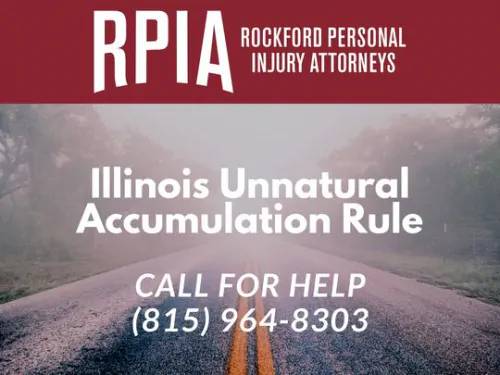What to do After a Slip and Fall Accident

Some slip and fall incidents occur naturally, and some could have been prevented.
In Illinois, we have a rule that governs if a slip and fall accident was a natural or non-natural occurrence. It’s call the unnatural accumulation rule. Slip and fall cases fall under a premise liability personal injury claim.
Learn More About Premise Liability Claims Here: Rockford Personal Injury Premise Liability
If you’ve been injured in a slip and fall accident we recommend contacting your primary care physician (PCP). But, if you don’t have a PCP, or are in an emergency situation, you can visit any local emergency room (ER). If you’re located in Rockford here are some clinics that can help you:
- Physician’s Immediate Care
- Mercy Health Urgent Care
- Swedish American Immediate Care
- Ortho Illinois’ Walk-in Injury Express
Keep Good Records and Notes
Slip and Fall personal injury claims are highly fact-specific. If you feel that your accident was caused by negligence and plan to file a lawsuit, good records and notes can help. After your injury is cared for by a medical professional take some time to write down everything you remember about your accident and even go back to capture any images if available.
If you have any questions or need some guidance in what to do next – Call A Premises Liability Lawyers Now
What is Unnatural Accumulation?
Unnatural accumulation refers to snow, ice, and water existing in a place where it naturally wouldn’t occur. Here in Northern Illinois we frequently have to deal with is snow, ice, and wet weather conditions. Our personal injury law firm sees many “slip and injured”, or “slip and fall” cases where someone has been hurt due to a fall at a business, or on someone’s property.
Illinois Unnatural Accumulation Rule
Illinois generally follows what is called the “unnatural accumulation rule” which in non-lawyer words, this can be broken down into two different ways to look at how a slip and fall injury occurs based on snow, ice, or wet weather conditions:
- A business owner generally owes a “duty” to patrons of its business. However, there is NOT a recognized duty to remove snow, ice, or water that naturally occurs on the premises. So for example, if snow falls overnight, and a store opens at 8:00 am the next morning. If someone arrives at the store, attempts to go into the store, and slips in the parking lot in the fresh snow, a Court will NOT hold the premises owner liable for that injury as it accumulated naturally.
- A business owner or premises owner DOES owe a “duty” to its patrons if the business or premises owner takes the initiative to remediate snow, ice, or water on its premises. For example, if a property owner uses a snowblower or a shovel to move snow around on their property and a large pile of snow develops, the eventual water melt would not have occurred but for the unnatural accumulation from the snow removal effort causing such a large pile of snow. Or, if there is a rooftop drainage system for water/snow-ice melt that directs water into a highly trafficked area with gutters where it otherwise would not be present, there is a potential liability to the property owner if the design of such a system causes an unnatural accumulation of water, snow, or ice that leads to a fall with a resultant injury.
Tracked-In Snow, Ice, and Water
A common inquiry we receive during cold weather months stems from when people enter or leave a building. “Tracked-in” snow, ice, and water can cause slippery conditions that lead to injury.
Generally, our courts have held that this “tracked-in” snow, ice, and water, is “natural accumulation”.
Some stores that are proactive and want to warn their patrons of the conditions will put up slippery floor signage, but there still is generally no duty to keep premises clear of “tracked-in” snow, ice, or water in Illinois, or to warn individuals of the conditions, since it is considered.
Read More – “natural” accumulation. Reed v. Galaxy Holdings, Inc. https://cite.case.law/ill-app-3d/394/39/
Slip and Fall Frequently Asked Questions (FAQs)
What Can Happen From a Fall?
Statistically based on CDC reports, one in five falls result in serious injuries (a fracture or head injury) to the victim.
Annually 3 million adult falls occur in the United States and require treatment in an emergency room.
The CDC lists off typical injuries such as broken wrists, arms, ankles, and hip fractures, as well as the fact that falls are the most common cause of traumatic brain injuries (TBI).
What Do I Do if I’ve Suffered an Injury From Falling?
- The first thing to do is if you’re able to, is ensure what the extent of your injuries are. If you can safely transport yourself to be treated, do so. If you cannot move without significant pain, have the premises owner call an ambulance for you. The most important thing about your injury is that you get back to normal as quickly as possible, not making the injury worse is extremely important.
- If you’re safely able to do so, ask someone to take photos of what caused your injury, or you can take the photos as well.
- Make sure to notify someone that is employed by the store to fill out an incident report of your injury. This generally triggers an obligation for most businesses that they will have to secure any video or security camera/video footage they have of the incident so that your lawyer can review it at a later date.
- Follow all of your treatment professional’s advice to ensure that you recover as quickly as possible.How Long Will My Case Take?
The timeline of a case generally hinges on when the client is back to being healthy. So we can’t say if your case would take 2 months, or if your case will take over a year. If there is a lot of treatment, physical therapy, or if your case involves a traumatic brain injury (TBI), there could be a bit of time that elapses from the date of injury until your case is over just because we will be waiting on some medical treatments to occur before we can get an idea of what the full extent of future medical expenses might be.
With some cases causing a lifetime of symptom management from the injury or an extended recovery period the conversation changes from simple calculations of how much various treatments cost and tallying up the amount that your health insurance company wants to be repaid. It then shifts in a more serious or catastrophic case to, how much money is going to be needed so that the client can be comfortable, and afford the medical treatments they will need for this projected period of time (years, to the rest of the client’s life). We would bring in a life care planner to review your medical records, talk to your treatment providers and they would make a recommendation of what the cost of your care will equate to over the lifetime of your injury. This calculation is then used not only in our demand but also if we need to file a lawsuit on your behalf this will be a major piece of evidence to show to a jury in order to earn you the recovery that you deserve.
Will I Have to Go to Court?
Possibly, if the insurance company for the store will not pay the demand you have us submit, or if we are looking at a case with permanent or a long period of recovery, then we likely will file a lawsuit on your behalf. You would not be required to be at every court date unless you wanted to be there. Simply put, you can be involved as much, or as little as you wish. We would only need you to be present for any depositions, or if your case required a trial to ask a jury to award you what we believe is fair.
Throughout any time in court, or at a deposition we would be working closely with you to go over the entire range of sights, sounds, and people who will be in the courtroom or at the deposition, and get you as comfortable with your surroundings as possible. If you would be testifying we will ensure that we get you acquainted with the courtroom before your first time there so you will get a better feeling for your surroundings to attempt to relieve any nervousness or apprehension you may have about needing to be in court.
How Long Do I Have to Start a Case if I Have Been Injured in a Slip and Fall in Snow, Ice, or Water?
Generally, you have two years (2) from the date of the incident to bring a claim in court and file a lawsuit. Remember that the insurance companies will attempt to de-value your injury claim if you do not seek treatment immediately, so that is extremely important to be obtaining treatment as soon as possible after an injury occurs.
Be aware that if your fall occurs on property owned by any municipal, local, state, or federal government you likely only have one year (1) to bring your claim.
Contact Rockford Personal Injury Lawyers For ANY Questions
Since slip and fall cases generally are highly fact-specific in how the fall occurred. We really need detailed information on whether or not it’s a case. If you’ve been injured in a slip and fall accident it’s best to call us ASAP so the facts are fresh in your mind.
For further information on any snow, ice, or water-related slip and fall, or trip and injured personal injury cases please contact the Rockford Personal Injury Lawyers. You can contact us via email, or feel free to call or text message us 24/7/365 at (815) 964-8303.

